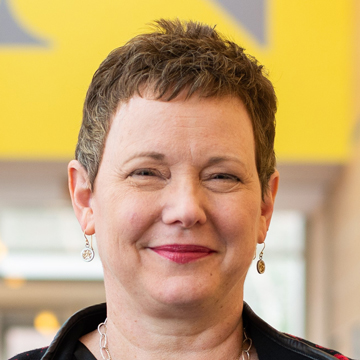Lambert Conference on the Future of Human-Computer Interaction + Design
How technology will influence how we live, work and play
Northwestern’s Center for Human-Computer Interaction + Design (HCI+D) coordinated an engaging conference on how technology will influence the way we live, work, and play.
Guest speakers explored the future of human interaction + design across spaces including healthcare, work, creativity, artificial intelligence, data visualization, and community-centered design.
Conference participants were encouraged to discover new interaction paradigms to support a collaborative, sustainable, and equitable society.
All conference sessions and events were hosted in person and observed Northwestern’s COVID protocol.
Download the full program including detailed list of featured speakers
Jump to a section
Conference Sessions
View a selection of individual sessions from the two-day conference.
Brooke Foucault-Wells:
The Speech We Miss: The Promise and Peril of Computational Methods for Understanding Youth Civic Engagement
Associate Dean for Research, College of Art, Media, and Design, Northeastern University
Matt Easterday:
Challenges of HCI+D for Civic Technology
Challenges of HCI+D for Civic Technology Associate Professor, School of Education and Social Policy, Northwestern University
James A Landay:
AI for Good Isn't Good Enough: A Call for Human Centered Design
Professor of Computer Science and the Anand Rajaraman and Venky Harinarayan Professor, School of Engineering, Stanford University; Cofounder and Vice-Director, Stanford Institute for Human-Centered Artificial Intelligence (HAI)
Elizabeth Mynatt:
Challenges for Human Centered AI in Supporting Equitable Health and Wellness
Dean, Khoury College of Computer Sciences, Northeastern University
Elizabeth Churchill:
HCI UX Building Teams Influencing Strategy Translating Impact
Director of User Experience, Google; Executive Vice President, Association of Computing Machinery (ACM); Member, ACM’s CHI Academy; ACM Distinguished Scientist and Distinguished Speaker
Noshir Contractor:
People Analytics Using Digital Exhaust to Leverage Network Insights in the Algorithmically Infused Workplace
Jane S. and William J. White Professor of Behavioral Sciences in Industrial Engineering & Management Sciences and (by courtesy) Computer Science; Professor of Communication Studies; Professor of Management and Organizations, Northwestern University
Jodi Forlizzi:
Design and AI Innovation
Herbert A. Simon Professor in Computer Science and Human-Computer Interaction and Associate Dean for Diversity, Equity, and Inclusion, School of Computer Science, Carnegie Mellon University
Duri Long:
Fostering Public Engagement with AI through Creativity
Assistant Professor, Communication Studies, Northwestern University
Featured Speakers

Elizabeth Churchill:
A Conversation on Leadership (And Amplifying the Impact of HCI and Design)
Director of User Experience, Google; Executive Vice President, Association of Computing Machinery (ACM); Member, ACM’s CHI Academy; ACM Distinguished Scientist and Distinguished Speaker
Dr. Churchill is a Director of UX at Google and Cochair of Google’s UX Leadership Council. With a background in psychology, Artificial Intelligence and Cognitive Science, she draws on social, computer, engineering, and data sciences to create innovative end-user applications and services. She has built research teams at Google, eBay, Yahoo, PARC and FujiXerox. Her current focus is on the design of effective designer and developer tooling for a new operating system, Fuchsia.
Dr. Churchill holds a PhD from the University of Cambridge and honorary doctorates from the University of Sussex and the University of Stockholm. She is a member of the Association for Computer Machinery’s ( ACM) CHI Academy, is an ACM Fellow, and an ACM Distinguished Speaker. She served as the ACM’s Vice President for 2 years, from 2018-2020. In 2016 she received a Citris-Banatao Institute Athena Award for Women in Technology for her Executive Leadership. She has been named one of the top women leaders in UX over the last several years.

Sheena Erete:
Paradigms of Power: Reimagining Participatory Design Practices When Engaging with Communities
Associate Professor, College of Information, University of Maryland, College Park; Founder and Director, Community Research and Design Collective
Dr. Erete is a researcher, educator, designer, and community advocate, whose research focuses on codesigning socio-cultural technologies, practices, and policies with community residents to amplify their local efforts in addressing issues such as violence, education, civic engagement and health. The objective of her work is to create more just and equitable outcomes and futures for those who have historically and who currently face structural oppression. Her research has won several best paper awards in top venues such as ACM CHI, CSCW, and SIGCSE as well a diversity and inclusion award for her collaborative work dissecting oppression that exists in the field of computing, HCI, and design. Her work has been supported by the National Science Foundation, Illinois Criminal Justice Information Authority, and several philanthropic foundations including the Polk Bros. Foundation, Pritzker Pucker Family Foundation, and McCormick Foundation. She is currently an associate professor in the College of Information at the University of Maryland College Park, where she founded the Community Research and Design Collective. Dr. Erete received bachelor of science degrees in mathematics and Computer Science from Spelman College. She received a master’s in computer science from Georgia Tech and a PhD in Technology & Social Behavior from Northwestern University.

Jodi Forlizzi:
Design and AI Innovation
Herbert A. Simon Professor in Computer Science and Human-Computer Interaction and Associate Dean for Diversity, Equity, and Inclusion, School of Computer Science, Carnegie Mellon University
Dr. Forlizzi is the Herbert A. Simon Professor of Computer Science and Human-Computer Interaction in the School of Computer Science at Carnegie Mellon University. She is also the Diversity, Equity, and Inclusion Lead in the School of Computer Science. She is responsible for establishing design research as a legitimate form of research in HCI that is different from, but equally as important as, scientifi c and human science research. Dr. Forlizzi has advocated for design research in all forms, mentoring peers, colleagues, and students in its structure and execution, and today it is an important part of the HCI community. Her current research interests include designing human-robot interaction as a service and human-AI collaboration in the domains of eldercare, accessibility, human assistance, and overall wellbeing.

James Landay:
“AI For Good” Isn’t Good Enough: A Call for Human-Centered AI
Professor of Computer Science and the Anand Rajaraman and Venky Harinarayan Professor, School of Engineering, Stanford University; Cofounder and Vice-Director, Stanford Institute for Human-Centered Artificial Intelligence (HAI)
Dr. Landay is a Professor of Computer Science at Stanford University, specializing in human-computer interaction (HCI). Previously, Dr. Landay was a Professor of Information Science at Cornell Tech in New York City and prior to that a Professor of Computer Science & Engineering at the University of Washington. His current research interests include Technology to Support Behavior Change, Demonstrational Interfaces, Mobile & Ubiquitous Computing, and User Interface Design Tools. He is the founder and codirector of the World Lab, a joint research and educational effort with Tsinghua University in Beijing.

Elizabeth Mynatt:
Challenges for Human-Centered AI in Supporting Equitable Health and Wellness
Dean, Khoury College of Computer Sciences, Northeastern University
Dr. Mynatt is the Dean of Khoury College of Computer Sciences following a 23-year career at Georgia Institute of Technology where she most recently served as a Regents’ Professor in the School of Interactive Computing and executive director of the Institute of People and Technology. Dr. Mynatt is an internationally recognized expert in the areas of ubiquitous computing, human-centered computing, health informatics, and assistive technologies. Currently she is coPI for the NSF AI-CARING Institute and Emory University’s Cognitive Empowerment Program, both with the goal to create longitudinal, interactive AI technologies to empower older adults and their care networks.
In 2015 she became a Fellow of the Association of Computing Machinery (ACM) for contributions to human-centered computing and the development of health information technologies. She has been recognized as a member of the ACM SIGCHI Academy, and an AAAS, Sloan, and Kavli research fellow. Dr. Mynatt has published more than 100 scientifi c papers, led grants from the NSF and NIH, and chaired the CHI 2010 conference, the premier international conference in human-computer interaction.

Vidya Setlur:
The Role of Functional Aesthetics in Visual Analysis
Director of Research, Tableau/Salesforce
Dr. Setlur is the director of Tableau Research. She leads an interdisciplinary team of research scientists in areas including data visualization, multimodal interaction, statistics, applied ML, and NLP. She earned her doctorate in Computer Graphics in 2005 at Northwestern University. Prior to joining Tableau, she worked as a principal research scientist at the Nokia Research Center for seven years. Her personal research interests lie at the intersection of natural language processing and computer graphics to better understand data semantics and user intent to inform the meaningful visual depiction of data. She recently coauthored a book titled Functional Aesthetics for Data Visualization.
Back to top